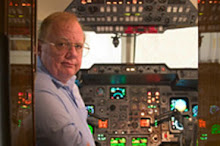Discussions
11:56 am - TuesdayWho was David Warren, inventor of the aircraft Cockpit Voice Recorder, benefactor of the flight safety
Rome, Italy - A tribute by Italian commander Renzo Dentesano
(WAPA) - Reports of death of doctor in science David Ronald de Mey Warren (20 March 1925-19 July 2010), which occurred July 19 in Melbourne (Australia), inventor of the commercial aircraft's "Sound recording in the cockpit". He was “Known to the world of aviation as the Australian scientist who invented (in 1956) and later developed the Cockpit Voice Recorder (CVR) in the wake of disasters of the first commercial airplane with jet engines, the British De Havilland Comet”.
We recall that between 1953 (May 2nd) and 1954 (January 10th and April 8th) there were, in quick succession, three (then) mysterious air disasters such as a four-engine in Calcutta (India) and in the Tyrrhenian Sea, respectively off Elba island and in Gulf of Policastro. Following these disasters, Dr. Warren, having participated, as an expert, the investigation on Calcutta "Crash" inquiries, conceived the idea of trying to create a tape recorder who could hold the audible sounds and verbal communications in cockpit of commercial aircraft as a valuable assistance to investigators of aircraft accidents, in order to better understand what were the real causes and possible contributing factors of aircraft accidents.
At the time, for these purposes, there was only a primitive recording electro-mechanical flight data, the "Flight Data Recorder - FDR", which could write on special strips of foil through staple connected to five sensors installed on the aircraft, only five flight parameters, as well as marking the time of the event recorded.
Only two years later (in 1956) Warren had already made the first CVR, which was based on a recording apparatus which used magnetic tape and had the ability to record communications and audible sounds in the cockpit and to keep duration of 30 minutes before auto-delete the sounds of first minutes to make the tape usable for the next 30 minutes and so on.
This invention was, in the scientist's intentions, to add a new dimension to diagnosis, to complete the picture which could be formed in the minds of investigators following the reconnaissance of the wreck and of the place where it laid.
Soon after, he devoted himself to join his invention with the new "Flight Data Recorder - FDR”, which in turn also become magnet-operated, and after to operate in digital.
They had many other disasters happened to commercial aircraft before the aeronautical authorities of member countries in ICAO (International Civil Aviation Organization) would recognize and understand - in their technical meetings on the subject of investigation - how important this new and modern "Recorder board" could be and then decide to require the mandatory installation aboard all commercial aircraft weighing over 5700 kilograms.
So many aircraft disasters occurred, in which were also used recordings by the CVR, could be solved not only relying on the data and the voices of pilots and controllers involved, FDR recorded, but also by other sounds recorded by CVR, such as the engines sound or characteristic noises generated from the cockpit, hit in mid-air by violent hailstorms.
David Warren, eldest son of an European native, was born in a small island next to the shores of the Northern Territory and was orphaned at the age of nine, when his father was killed in a plane crash in 1934 occurred in Bass Strait.
From 1952 (just 27 years old) and up to 1983, Warren was the principal scientist involved in the research laboratories of the organization Aeronautics Defence Australian Government, located in Melbourne and in 2002 was honored with the title of officer of the Order of Australia (AO).
Warren is so worthily remembered in history as a benefactor of the International Civil Aviation air accident investigation capability, and thus also as a benefactor of in pro-safety prevention in flight.
This paper, in my capacity as investigator certified by US NTSB (National Transportation Safety Board) and as a former member of ISASI (International Society of Air Safety Investigators), wants to be a moving tribute of gratitude to the memory of David Warren, benefactor of flight safety and accident prevention to the commercial aviation world.
See also the news on the subject published by AVIONEWS.
(Avionews)
(00500)100727115640-1119481
(World Aeronautical Press Agency - 2010-07-27 11:56 am)
What a great contribution to improving safety in aircraft and helping to understand the causes of aircraft accidents. His invention of the cockpit voice recorder has advanced aviation safety and helped protect the lives of pilots around the world.
JetAviator7

